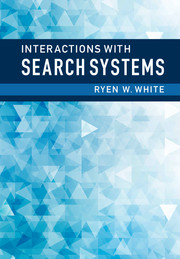Book contents
- Frontmatter
- Dedication
- Contents
- Preface
- 1 Introduction
- Part I Background
- Part II System SupportHelping People Search
- 5 Helping People Search
- 6 Exploration, Complexity, and Discovery
- 7 Learning and Use
- 8 Interaction beyond the Individual
- 9 Personalization and Contextualization
- Part III Evaluation
- Part IV Opportunities and Challenges
- Notes
- References
- Index
- Plate section
7 - Learning and Use
from Part II - System SupportHelping People Search
Published online by Cambridge University Press: 05 March 2016
- Frontmatter
- Dedication
- Contents
- Preface
- 1 Introduction
- Part I Background
- Part II System SupportHelping People Search
- 5 Helping People Search
- 6 Exploration, Complexity, and Discovery
- 7 Learning and Use
- 8 Interaction beyond the Individual
- 9 Personalization and Contextualization
- Part III Evaluation
- Part IV Opportunities and Challenges
- Notes
- References
- Index
- Plate section
Summary
Learning involves the acquisition of new, or the modification of existing, knowledge, skills, and behaviors. This chapter focuses on the use of search systems to support learning-related activities. I discuss aspects of the psychology of learning, and how people apply what they have learned during the information-seeking process. Modeling and supporting learning is essential in next-generation search technology. Support for learning will become an important aspect of how we design search systems, as well as how we evaluate these systems to understand their utility. Search systems can help people learn new content and also be reminded about content accessed historically. Providing the context of previous learning episodes and helping restore searcher state and refresh their understanding of the current search topic, if it is not in a subject area reflective of their regular interests.
Searching is similar in many ways to learning (Schmeck, 1988; Davis and Palladino, 1995). Previous work has provided some basis for a strong connection between searching and learning based on the construction of enhanced knowledge structures as a person assimilates new information attained during the search process with existing knowledge (Wittrock, 1974; Yankelovich et al., 1985). Case (2002) states that sense-making (such as that described in Chapter 4) is theoretically grounded in the constructivist learning theories of Dewey (1933), who in turn argued that learning can only occur through the activity of problem solving. The psychology community has explored learning in detail (e.g., Piaget [1952] and Vygotsky [1962] studied learning in the context of childhood development). Systems such as SuperBook (Egan et al., 1989) and SuperManual (Folz and Landauer, 2007) have improved the usability of existing content, books and manuals respectively, via computer-based enhancements such as rich indexing (to help address the vocabulary mismatch problem) and fisheye visualizations (Furnas, 1986) (to help people navigate and orient within text). Such enhancements can help people better comprehend text and generate better quality information artifacts in composition tasks. In creating systems where the focus is on learning, lessons can be drawn from the e-learning and intelligent tutoring communities (Corbett et al., 1997), such that searchers can be purposely engaged in sustained reasoning activities during browsing. Related work in the hypertext community, including research on the creation of guided tours (Trigg, 1988) through document collections, may also help people in support of learning and understanding.
- Type
- Chapter
- Information
- Interactions with Search Systems , pp. 231 - 248Publisher: Cambridge University PressPrint publication year: 2016
- 1
- Cited by



